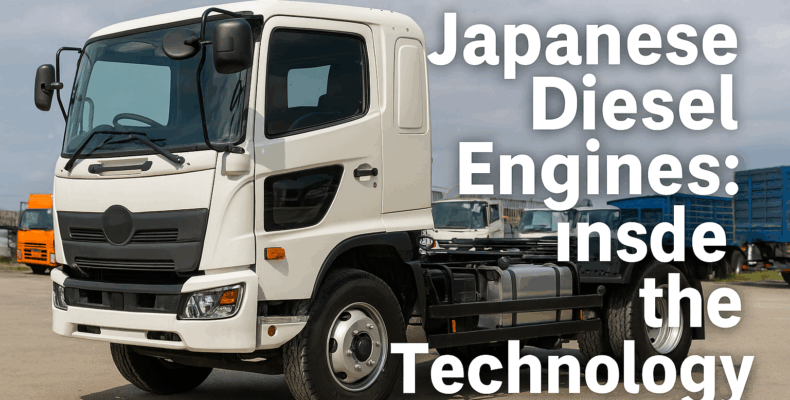Japanese Diesel Engines: Reliable Power and Technology You Can Trust
Japanese diesel engines are known around the world for being powerful, fuel-efficient, and long-lasting. These engines are the heart of countless trucks, buses, and commercial vehicles operating globally.
In this article, we’ll explore the core technology behind Japanese diesel engines, what makes them different, and why they are the top choice for international importers looking for performance and reliability.
1. What Makes Japanese Diesel Engines So Popular?
There are several key reasons why global buyers prefer Japanese diesel engines:
-
Durability: Many engines last over 500,000 km with proper maintenance.
-
Fuel Efficiency: Advanced fuel injection systems maximize every drop of diesel.
-
Low Emissions: Designed to meet strict environmental standards.
-
Compact Yet Powerful: Small engine blocks with big torque output.
Moreover, Japanese brands constantly improve their technology. They focus on real-world performance and long-term value.
2. Trusted Manufacturers and Their Innovations
Japanese companies like Hino, Isuzu, Mitsubishi Fuso, Toyota, and Nissan lead the industry in diesel innovation. Let’s take a closer look:
● Hino Motors
Known for its A05C and A09C engines, which balance power and efficiency. Used in medium and heavy-duty trucks.
● Isuzu
The 4HK1 and 6HK1 engines offer great fuel economy and low maintenance costs.
● Mitsubishi Fuso
Their 4P10 engine is used in Canter trucks. It’s compact but powerful, with BlueTec emissions technology.
● Toyota
Often uses diesel in vans like the Hiace, with a focus on quiet, smooth running.
● Nissan
Well-known for reliable diesel engines in models like the Caravan and Atlas.
As a result, these brands continue to dominate in both domestic and export markets.
3. How the Technology Works: A Simple Breakdown
Understanding diesel engine mechanics can help you choose better.
| Component | Function |
|---|---|
| Turbocharger | Increases air pressure for more power |
| Common Rail System | Controls fuel injection precisely |
| Intercooler | Cools air to improve combustion |
| ECU (Computer Unit) | Adjusts performance in real time |
For example, the common rail system injects fuel at high pressure, ensuring better combustion and fewer emissions.
4. Advantages for Global Importers
Importers benefit in many ways when they choose Japanese diesel-powered vehicles:
-
Long engine life = Better return on investment
-
Low fuel use = Reduced operating costs
-
Easy part availability = Fast, low-cost repairs
-
Emission control = Suitable for strict regions
-
High resale value = Popular in used vehicle markets
In fact, many African, Caribbean, and Southeast Asian fleets rely almost entirely on Japanese diesel trucks.
5. Popular Diesel-Powered Export Models
| Vehicle Model | Engine Type | Best Use Case |
|---|---|---|
| Hino Ranger | A05C | Regional cargo delivery |
| Isuzu Elf | 4JJ1 | City transport, courier services |
| Mitsubishi Canter | 4P10 | Light-duty logistics |
| Toyota Hiace Van | 1KD-FTV | Personnel or cargo transport |
| Nissan Atlas | ZD30DDTi | Multi-purpose urban delivery |
For instance, the Hiace diesel is trusted for passenger transport in Kenya and the Philippines.
6. Buy from Exporters You Can Trust
To get a high-quality diesel truck or van, work with a reliable exporter in Japan.
We recommend this trusted list of exporters:
👉 Top 5 Trusted Japanese Used Truck Exporters for Global Buyers
They offer:
-
Pre-export inspections
-
Accurate documentation
-
Global shipping
-
Responsive customer service
Additionally, they support buyers in over 100 countries.
7. Final Thoughts: Power You Can Count On
To sum up:
-
Japanese diesel engines offer durability, power, and low fuel use.
-
Their technology evolves with the needs of the global market.
-
You can trust Japanese trucks to perform in all conditions.
So, whether you’re in logistics, farming, or construction, choosing a Japanese diesel engine is a smart and reliable decision. Start your journey today with a truck that’s built to last.
